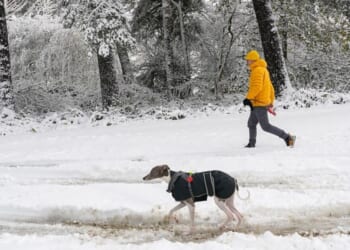
An Associated Press exclusive detailed an investigation into law enforcement’s use of Automated License Plate Recognition (ALPR) technology, especially its use by the U.S. Customs and Border Patrol (CBP) to monitor, track, and apprehend criminal illegals. The use of ALPR also assists in drug and human trafficking activity, which helps build evidence toward more accurate and bigger stings. With some lawmakers and activist judges working to thwart the Trump administration in its enforcement and deportation efforts, CPB is using every tool in the tool chest to reduce the use of surges and raids, and to bypass activist and citizen efforts to engage and disrupt the work of enforcement.
ALPR is nothing new. It has been used for over 20 years by law enforcement agencies, and as with all technology and the incorporation of AI, the tech has advanced by leaps and bounds. While its use has raised concerns about privacy and misuse, lawmakers in at least 10 states introduced legislation to limit and restrict ALPR; yet, none of those bills advanced. Even California Governor Gavin Newsom vetoed a measure passed by his Democrat-controlled legislature, which would have restricted how and when police agencies use and share ALPR data. This is the height of hypocrisy, as Newsom is suing the mayor of El Cajon for sharing the city’s ALPR data with other public agencies, alleging it violates California’s sanctuary state law. As Mayor Bill Wells wrote on his X account in Oct., “This isn’t about privacy; it’s about politics.”
California’s own law (SB 34) makes it clear: public agencies can share information with other public agencies — and that’s exactly what El Cajon has done.
Now, the State of California is suing us for following the law and doing our job to keep people safe. This isn’t about… pic.twitter.com/zKm3VBUKLc
— Bill Wells (@MayorBillWells) October 7, 2025
His post continued:
El Cajon is one of the few conservative cities left in California, and Sacramento is trying to make an example out of us. We will not be bullied for standing up for public safety and for refusing to bow to their political agenda.
Read More: Newsom Is Suing the City of El Cajon Because the Mayor Won’t Bend the Knee to His Anti-Trump Agenda
Kamala Harris Championed California’s Sanctuary State Policies and People Are Dead As a Result
But AP barely addressed these concerns. Instead, it is making it solely about how CBP is using ALPR data to violate American citizens‘ Fourth Amendment protections, so beware.
The U.S. Border Patrol is monitoring millions of American drivers nationwide in a secretive program to identify and detain people whose travel patterns it deems suspicious, The Associated Press has found.
Not secretive at all. A cursory internet search brought up several documents from the Department of Homeland Security, law firms, and tech blogs outlining how ALPR works, how law enforcement agencies use it and the information it collects, and a person’s legal rights in how their data is accessed, stored, and used. It’s all out in the open for any journalist or citizen to access. Yet, the Associated Press wrote:
Once limited to policing the nation’s boundaries, the Border Patrol has built a surveillance system stretching into the country’s interior that can monitor ordinary Americans’ daily actions and connections for anomalies instead of simply targeting wanted suspects. Started about a decade ago to fight illegal border-related activities and the trafficking of both drugs and people, it has expanded over the past five years.
The Border Patrol has recently grown even more powerful through collaborations with other agencies, drawing information from license plate readers nationwide run by the Drug Enforcement Administration, private companies and, increasingly, local law enforcement programs funded through federal grants. Texas law enforcement agencies have asked Border Patrol to use facial recognition to identify drivers, documents show.
Typical of legacy media, the wire service is setting a narrative to make these efforts look calculated and nefarious.
The predictive intelligence program has resulted in people being stopped, searched and in some cases arrested. A network of cameras scans and records vehicle license plate information, and an algorithm flags vehicles deemed suspicious based on where they came from, where they were going and which route they took. Federal agents in turn may then flag local law enforcement.
Suddenly, drivers find themselves pulled over — often for reasons cited such as speeding, failure to signal, the wrong window tint or even a dangling air freshener blocking the view. They are then aggressively questioned and searched, with no inkling that the roads they drove put them on law enforcement’s radar.
Dive Deeper: Watch: Second Anti-ICE Agitator Cuffed After ‘High-Speed Pursuit’ Amid ‘Charlotte’s Web’ Mission
7th Circuit Clips District Court’s Wings on Chicago Immigration Enforcement
My husband and I just took an extensive road trip from the South to the West. On the way back, we encountered a Border checkpoint on the I-20 in Texas between Midland and Odessa. Before we even rolled up to the CBP officers, they had scanned our license plate, we were identified, every bit of critical information about us was at their disposal. Part of my husband’s job is driving, so he has a long digital footprint, as do I.
When we reached the officers and rolled down our window, they simply asked, “Are you a U.S. citizen? We both said, “Yes,” and they waved us on. On the one hand, we had a glancing thought about the scope of the surveillance; on the other hand, we felt safe. This is what we voted for.
AP continued:
The inspection process includes capturing license plate information prior to the vehicle arriving to a CBP officer or agent. Each vehicle inspection lane has a standard set of equipment that captures front and rear license plates, takes driver and scene images, and reads RFID-enabled travel documents. License plate recognition (LPR) reduces manual entry by CBP agents and officers, resulting in focused attention on the vehicle and occupants.
That was at a formal CBP checkpoint and should be expected. As stated above, populated along interstate and state highways is ALPR technology in plain sight and out of it, which assists local and federal law enforcement in their efforts to keep the public safe and apprehend bad actors. Yet, it is still a delicate dance between freedoms and public safety.
The role of LPR is critical to CBP’s mission and field operations. Since 2008, SAIC has supported CBP’s Land Border Integration (LBI) team in developing, deploying, and maintaining LPR solutions which enhance security and efficiency in the inspection process. We deploy and maintain 700 LPR systems at more than 100 of the busiest land border crossings and U.S. Border Patrol checkpoints nationwide.
But the bogeyman has been unleashed, and certain municipalities, especially in California, are clutching the pearls and expressing outrage. Some are rescinding their participation with private data gathering companies like FLOCK, which collects, manages, and shares ALPR data.
Santa Cruz has paused its statewide FLOCK camera data sharing after discovering that out-of-state agencies, including ICE, accessed license plate data illegally without local police knowledge, prompting community concern and reevaluation of FLOCK camera use.
Out-of-state agencies had illegal access to several California FLOCK camera databases, including those in Santa Cruz and Capitola, unbeknownst to local police.
WATCH:
Santa Cruz has paused its statewide FLOCK camera data sharing after discovering that out-of-state agencies, including ICE, accessed license plate data illegally without local police knowledge.
Read more: https://t.co/cDI5tfzhJI pic.twitter.com/72am3mHEN5
— KSBW Action News 8 (@ksbw) November 21, 2025
“Illegal access” is another deceptively written phrase. It could only be deemed illegal in regard to the 2017 California Values Act (SB 54), which prohibits law enforcement from cooperating with CBP and ICE enforcement.
FLOCK cameras capture the license plates of cars driving by, and a national search tool has been added without informing local police.
Capitola Police Chief Sarah Ryan said, “Capitola PD became aware of this issue only after receiving a Public Records Act request in October 2025.”
The department has since discovered that some of those searches were done for ICE.
Winner, winner, chicken dinner! The anti-ICE contingent is big mad over this information, and those illegals must be protected at all costs, even to its own law-abiding citizens.
Since February 11, measures have been put in place to prevent future occurrences, including deactivating the national search tool.
Concerns have arisen that agencies within California have also been conducting database searches on behalf of these out-of-state agencies, prompting Santa Cruz to pause all in-state FLOCK camera data sharing as of Tuesday night.
The Washington state community of Lynnwood has also paused its use of FLOCK over similar concerns. The following X post clearly outlines the process the city council went through to implement the FLOCK program, and the amount of good that has resulted from it. Yet, they have twisted themselves into pretzels because ICE may have accessed their data, and that is beyond the pale.
🚨BREAKING: LYNNWOOD PD SUSPENDS FLOCK CAMERA SYSTEM AMID CONCERNS OVER ICE ACCESS
The Lynnwood Police Department (LPD) has temporarily paused use of its Automated License Plate Reader (ALPR) system, known as Flock Cameras, to address community concerns about data privacy and… pic.twitter.com/Vt4Cd6Pj5m
— Lynnwood Times (@LynnwoodTimes) November 7, 2025
The Lynnwood Police Department (LPD) has temporarily paused use of its Automated License Plate Reader (ALPR) system, known as Flock Cameras, to address community concerns about data privacy and system access.
“Flock cameras have already proven to be an invaluable investigative tool in solving crimes and keeping our community safe,” said Police Chief Cole Langdon.
“However, it’s equally important that we maintain the public’s trust. Out of respect for the concerns raised and our commitment to transparency, we have chosen to pause the system while we strengthen safeguards to ensure the technology is used responsibly and lawfully.”
During this pause, all system access has been disabled, and cameras have been turned off. This decision reflects an abundance of caution and a proactive effort to ensure that the system’s operation fully aligns with community expectations, privacy standards, and legal requirements.
Mayor Christine Frizzell defended the use of flock cameras stating they continue to play a vital role in the city’s public safety efforts, granting valuable insights on criminal activity taking place within the city, and allowing the city to “strategically deploy” its resources.
“A University of Washington report on automatic license plate readers (or ALPR) data was released in which the Lynnwood Police Department’s use of the flock camera system was mentioned. In response our Chief of Police, and his team, put out a statement to the public reiterating our commitment to privacy and public safety,” said Frizzell.
At its January Business Meeting, the City Council approved the Lynnwood Police Department, in a unanimous vote, to enter into a two-year agreement with Flock Safety to lease 25 of its Falcon ALPR cameras to be placed at strategic—high traffic and/or high-crime—locations around the city. The first system came online back in June. By July of 2025, the flock cameras have detected 23 stolen vehicles each month, as well as 43 stolen plates presumably from stolen, or wanted, vehicles – which is three times the amount of recovered stolen vehicles the city of Lynnwood has recovered over the last three years.
COMMITMENT TO RESPONSIBLE TECHNOLOGY USE LPD remains confident in the public safety value of ALPR technology and is equally committed to earning and maintaining community trust. Before any reactivation, the Department will conduct a thorough review of vendor agreements, system settings, and departmental policies. This process involves collaboration with the City Administration, the Lynnwood City Council, and community stakeholders to ensure that privacy protections are robust and transparent.
BACKGROUND ON LYNNWOOD’S ALPR PROGRAM – Flock cameras provide officers with real-time information to identify and locate vehicles involved in crimes within our community. – Funded by a Washington Auto Theft Prevention Authority (WATPA) grant, the program deployed 25 cameras beginning June 29, 2025. – Shortly after implementation, LPD identified that a vendor feature called “nationwide search” which provided access that wasn’t authorized by LPD. – On July 8, 2025, the Department worked with Flock Safety to immediately disable the feature and control access. – On October 30, 2025, LPD paused the program entirely to further evaluate and enhance privacy controls.
POSITIVE OUTCOMES AND INVESTIGATIVE VALUE While active, the ALPR system contributed to numerous successful investigations and public safety efforts, including: – Averaging 66 alerts per month for stolen vehicles or license plates — the equivalent of nearly 800 alerts per year. – Assisting in the recovery of multiple stolen vehicles and the arrest of suspects involved in child sexual assault, narcotics investigations, theft, and identity crimes. – Locating a missing elderly male, helping ensure his safe return home. – Providing critical leads to regional law enforcement partners in ongoing criminal investigations. These successes underscore the potential of ALPR technology to support public safety when paired with responsible oversight and clear privacy safeguards.
COMMUNITY ENGAGEMENT AND NEXT STEPS LPD encourages residents to continue sharing feedback, ideas, or concerns about the use of ALPR technology in Lynnwood. Comments can be sent to: [email protected] The Department will provide regular updates as the review progresses and remains committed to a transparent, accountable process that balances safety, privacy, and community trust.
These pauses have also occurred in Oakland, CA, and other cities. While state lawmakers work to hash out the use of ALPR in their jurisdictions, the U.S. CBP will continue to find workable and legal tools to do its enforcement and stay steps ahead of both the criminal illegals and the anti-ICE/pro-illegal immigration left. The legal and astroturf campaigns to stall and completely halt immigration enforcement seem to have no limit, and CPB has to continue to find methods that will circumvent both.
Editor’s Note: Thanks to President Trump, illegal immigration into our great country has virtually stopped. Despite the radical left’s lies, new legislation wasn’t needed to secure our border, just a new president.
Help us continue to report the truth about the president’s border policies and mass deportations. Join RedState VIP and use promo code FIGHT to get 60% off your membership.

















